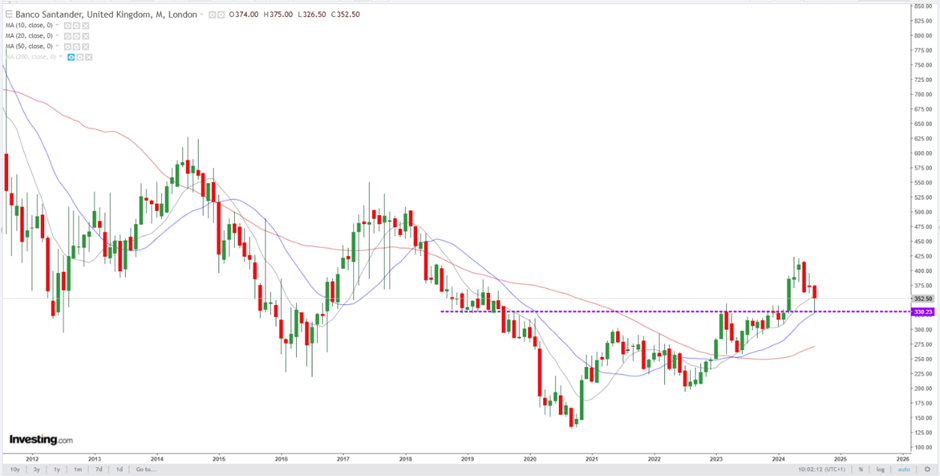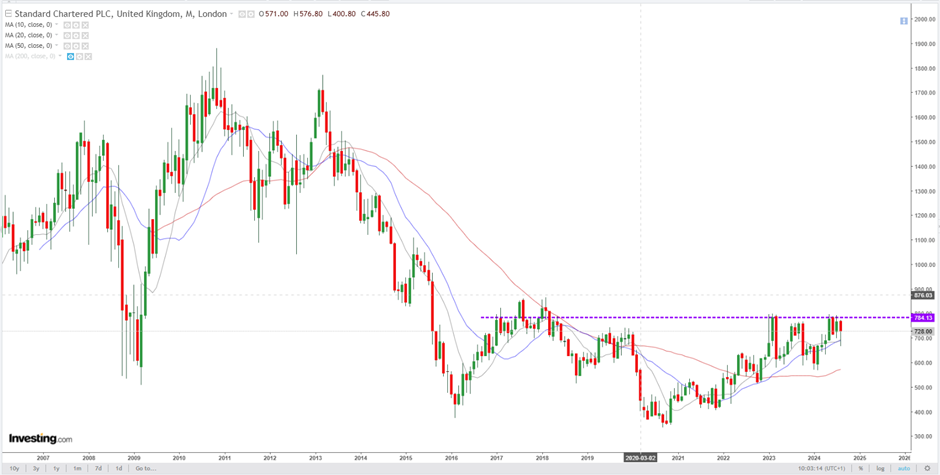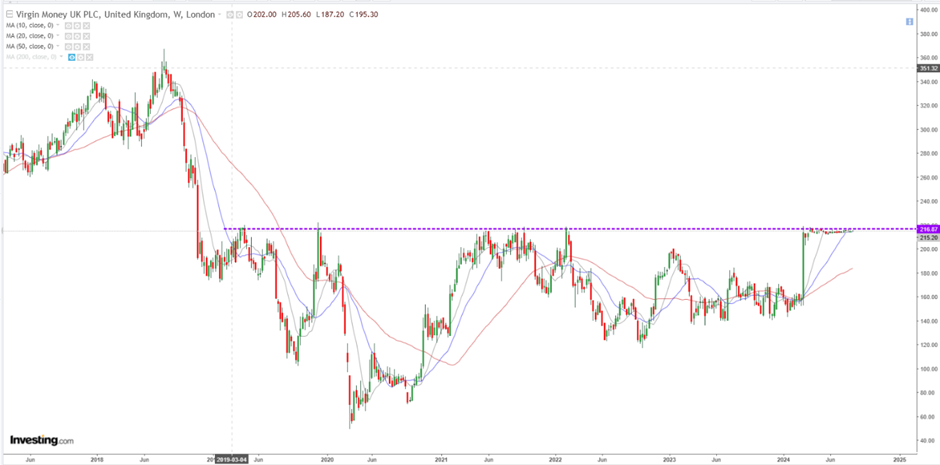Banking stocks have long been favoured by investors for their potential to deliver stable returns and dividends. Famous investors such as Warren Buffett and Charlie Munger have historically shown a preference for these stocks due to their ability to generate consistent cash flows, especially in a stable economic environment. Banks often have robust business models that can withstand economic cycles, thanks to their crucial role in the financial system. Additionally, the highly regulated nature of the banking industry adds a layer of security that appeals to conservative investors.
Investors are often drawn to banking stocks because of their inherent advantages, such as dividend yields, exposure to economic growth, and the potential for capital appreciation. Moreover, these stocks provide exposure to interest rate cycles, which can be advantageous when rates rise. The steady income from interest payments on loans, along with fee-based revenue streams, makes banks reliable earners even in uncertain economic times.
However, investing in banking stocks also requires a careful selection process. Famous investors like Warren Buffett often focus on criteria such as strong management teams, a history of profitability, and prudent risk management. They also favour banks with solid balance sheets, high capital ratios, and conservative lending practices. Below, I discuss my selection UK banking stocks, listed alphabetically, that have caught the attention of investors due to their technical and fundamental strengths.
Technical comment- quite a few of the big banking stocks have similar looking charts, please see Barclays (LON:BARC) below- specifically take note of the long, sustained sideways price action that’s been running this way since 2007. This low value is most likely reflective of the value of the stocks, and is a red flag when compared to almost any performance prior to that. I bring them up for two reasons:
1. People still want to invest in banking stocks
2. Some are breaking up out of the long-sustained sideways move, which could be an opportunity.
Barclays plc (BARC)
Barclays is a major player in both retail and investment banking, providing a diversified revenue stream that includes consumer banking, corporate banking, and investment services. The bank has capitalised on market volatility, particularly through its investment banking arm, which has performed well in recent quarters. From a technical standpoint, Barclays' stock has shown resilience, with recent movements indicating potential upward momentum. The bank's ongoing digital transformation and cost-cutting efforts further position it as a strong contender in the UK banking sector.
Technical analysis: Price is trending up, which is different from behaviour over the last decade.
Verdict: Buy for investors seeking a balanced exposure to retail and investment banking.
HSBC Holdings plc (LON:HSBA)
HSBC is one of the largest banks in the world, with a significant presence in Asia. This geographic diversification offers multiple growth avenues, particularly in high-growth markets like China. HSBC’s stock has demonstrated strong technical patterns, with bullish indicators suggesting continued strength. The bank’s strategic focus on Asia, coupled with its global footprint, makes it an attractive option for investors seeking international exposure with a balance of stability and growth potential.
Technical analysis: Price is trending up nicely, but resistance lies up ahead.
Verdict: Buy for long-term investors with a global outlook.
Lloyds Banking Group plc (LON:LLOY)
Lloyds is a dominant player in the UK retail and commercial banking sector, with a strong focus on the domestic market. It is particularly well-known for its significant share in the UK mortgage market, which contributes substantially to its revenue. The stock has shown relative stability, with technical indicators pointing to potential upside as the UK economy stabilises. Lloyds’ emphasis on digital banking and operational efficiency adds to its appeal, especially for investors looking for a solid, homegrown banking leader.
Technical analysis: Price is trending up, which is different from behaviour over the last decade.
Verdict: Buy for value investors with confidence in the UK economy.
Santander UK plc (BNC)
Santander UK, a subsidiary of the Spanish banking giant Banco Santander (BME:SAN), is a major player in the UK retail banking sector. The bank has shown steady performance, benefiting from its diverse range of financial products and services. However, it is also exposed to the broader economic environment in the UK, which could impact its profitability.
Technical analysis: Price is trending up, which is different from behaviour over the last decade. It’s a good trend.
Verdict: Hold, with potential upside if the UK economy stabilises.
Standard Chartered plc (LON:STAN)
Standard Chartered offers a unique proposition with its extensive focus on emerging markets, particularly in Asia, Africa, and the Middle East. The bank’s presence in these high-growth regions provides significant opportunities, albeit with higher associated risks. Technically, Standard Chartered's stock has been on an upward trajectory, supported by strong performance in its key markets. This makes it an appealing option for investors seeking exposure to dynamic economies outside the traditional Western markets.
Technical analysis: Price is testing a major level of resistance- if it breaks, there’s very good upside potential.
Verdict: Buy for investors seeking emerging market exposure with a higher risk tolerance.
Virgin Money UK plc (LON:VMUK)
Virgin Money is a smaller, but rapidly growing, player in the UK retail banking sector. The bank has focused heavily on digital transformation and enhancing customer experience, which has allowed it to gain market share. Virgin Money’s stock has shown promising technical signals, particularly as the bank continues to expand its presence in the UK market. For growth-oriented investors, especially those interested in digital banking innovation, Virgin Money presents an intriguing opportunity.
Technical analysis: Price is testing a strong resistance level. Worth watching this for a breakout.
Verdict: Buy for growth-oriented investors with a focus on digital banking.
The Cons of Owning Banking Stocks
While banking stocks can offer attractive returns, they come with their own set of risks. One of the main drawbacks is their sensitivity to economic cycles. Banks are highly leveraged institutions, and their profitability is closely tied to the health of the broader economy. During economic downturns, banks can suffer from higher default rates on loans, which can significantly impact their earnings.
Additionally, banking stocks are vulnerable to regulatory changes. The financial industry is one of the most heavily regulated sectors, and any changes in regulations can have a profound impact on a bank's operations and profitability. For instance, increased capital requirements or restrictions on certain types of lending can constrain a bank's ability to generate profits.
Another risk is exposure to interest rate fluctuations. While banks generally benefit from rising interest rates, which can widen net interest margins, they can also suffer if rates rise too quickly or if the yield curve inverts. This can lead to reduced lending activity and pressure on earnings.
Suggested Selection Criteria for Banking Stocks
For investors considering adding banking stocks to their portfolios, it’s important to adopt a rigorous selection process. The criteria used by famous investors like Warren Buffett can be instructive:
1. Strong Management Team: Look for banks with experienced and prudent management that has successfully navigated previous economic cycles.
2. Profitability History: Favour banks that have consistently demonstrated strong profitability, even during challenging economic periods.
3. Capital Strength: Prioritise banks with strong capital ratios and a conservative approach to risk management.
4. Dividend Yield: Consider banks with a history of paying steady or increasing dividends, as this can provide income even during market downturns.
5. Economic Moat: Focus on banks that have a competitive advantage, whether through scale, customer base, or technology, which can help sustain profitability in the long term.
I’ll leave you with that- plenty to chew on.
- English (USA)
- English (India)
- English (Canada)
- English (Australia)
- English (South Africa)
- English (Philippines)
- English (Nigeria)
- Deutsch
- Español (España)
- Español (México)
- Français
- Italiano
- Nederlands
- Português (Portugal)
- Polski
- Português (Brasil)
- Русский
- Türkçe
- العربية
- Ελληνικά
- Svenska
- Suomi
- עברית
- 日本語
- 한국어
- 简体中文
- 繁體中文
- Bahasa Indonesia
- Bahasa Melayu
- ไทย
- Tiếng Việt
- हिंदी
UK Banking Stocks – worth the risk?
Latest comments
Loading next article…
Install Our App
Risk Disclosure: Trading in financial instruments and/or cryptocurrencies involves high risks including the risk of losing some, or all, of your investment amount, and may not be suitable for all investors. Prices of cryptocurrencies are extremely volatile and may be affected by external factors such as financial, regulatory or political events. Trading on margin increases the financial risks.
Before deciding to trade in financial instrument or cryptocurrencies you should be fully informed of the risks and costs associated with trading the financial markets, carefully consider your investment objectives, level of experience, and risk appetite, and seek professional advice where needed.
Fusion Media would like to remind you that the data contained in this website is not necessarily real-time nor accurate. The data and prices on the website are not necessarily provided by any market or exchange, but may be provided by market makers, and so prices may not be accurate and may differ from the actual price at any given market, meaning prices are indicative and not appropriate for trading purposes. Fusion Media and any provider of the data contained in this website will not accept liability for any loss or damage as a result of your trading, or your reliance on the information contained within this website.
It is prohibited to use, store, reproduce, display, modify, transmit or distribute the data contained in this website without the explicit prior written permission of Fusion Media and/or the data provider. All intellectual property rights are reserved by the providers and/or the exchange providing the data contained in this website.
Fusion Media may be compensated by the advertisers that appear on the website, based on your interaction with the advertisements or advertisers.
Before deciding to trade in financial instrument or cryptocurrencies you should be fully informed of the risks and costs associated with trading the financial markets, carefully consider your investment objectives, level of experience, and risk appetite, and seek professional advice where needed.
Fusion Media would like to remind you that the data contained in this website is not necessarily real-time nor accurate. The data and prices on the website are not necessarily provided by any market or exchange, but may be provided by market makers, and so prices may not be accurate and may differ from the actual price at any given market, meaning prices are indicative and not appropriate for trading purposes. Fusion Media and any provider of the data contained in this website will not accept liability for any loss or damage as a result of your trading, or your reliance on the information contained within this website.
It is prohibited to use, store, reproduce, display, modify, transmit or distribute the data contained in this website without the explicit prior written permission of Fusion Media and/or the data provider. All intellectual property rights are reserved by the providers and/or the exchange providing the data contained in this website.
Fusion Media may be compensated by the advertisers that appear on the website, based on your interaction with the advertisements or advertisers.
© 2007-2025 - Fusion Media Limited. All Rights Reserved.
